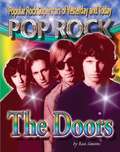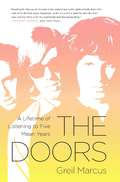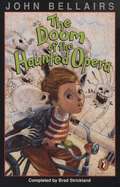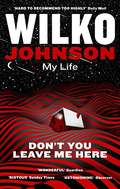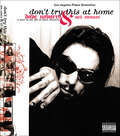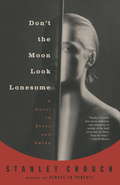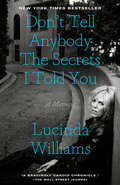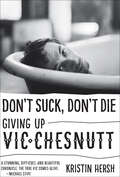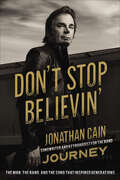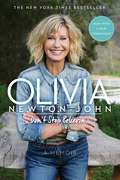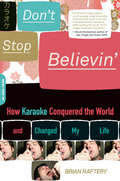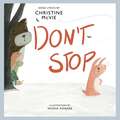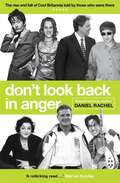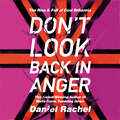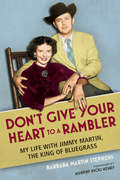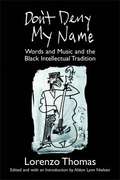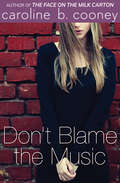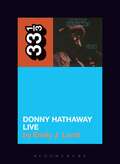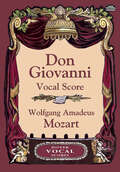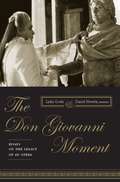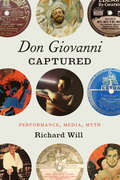- Table View
- List View
The Doors (Popular Rock Superstars of Yesterday and Today)
by Rae SimonsThe Doors were born in the sixties, a decade of bright colors, rebellion, and amazing creativity. Forty years later, you might think the Doors would seem like a relic from the past, like a tie-dyed T-shirt that's been washed too many times. But that's far from the case. Although this band definitely has its roots deep in the psychedelic, drug-soaked soil of the sixties, the Doors have managed to make the transition into the twenty-first century.
The Doors: A Lifetime of Listening to Five Mean Years
by Greil MarcusA fan from the moment the Doors’ first album took over KMPX, the revolutionary FM rock & roll station in San Francisco, Greil Marcus saw the band many times at the legendary Fillmore Auditorium and the Avalon Ballroom in 1967. Five years later it was all over. Forty years after the singer Jim Morrison was found dead in Paris and the group disbanded, one could drive from here to there, changing from one FM pop station to another, and be all but guaranteed to hear two, three, four Doors songs in an hour-every hour. Whatever the demands in the music, they remained unsatisfied, in the largest sense unfinished, and absolutely alive. There have been many books on the Doors. This is the first to bypass their myth, their mystique, and the death cult of both Jim Morrison and the era he was made to personify, and focus solely on the music. It is a story untold; all these years later, it is a new story.
The Doom of the Haunted Opera (Lewis Barnavelt #6)
by Brad Strickland Edward Gorey John BellairsWhen Lewis Barnavelt and Rose Rita Pottinger explore an abandoned theater, they discover an unpublished opera score. Ignoring a strange omen, they show it to their music teacher, who heralds "The Day of Doom" as a masterpiece. Then eerie Henry Vanderhelm, the composer's grandson, arrives--with a plan to awaken the dead and enslave the world!.
Don't You Leave Me Here: My Life
by Wilko Johnson'Man, there's nothing like being told you're dying to make you feel alive.' In 2013, Dr Feelgood founder, Blockheads member and musical legend Wilko Johnson was diagnosed with terminal cancer. With ten months to live, he decided to accept his imminent death and went on the road. His calm, philosophical response made him even more beloved and admired. And then the strangest thing happened: he didn't die. Don't You Leave Me Here is the story of his life in music, his life with cancer, and his life now - in the future he never thought he would see.
Don't You Leave Me Here: My Life
by Wilko Johnson'Man, there's nothing like being told you're dying to make you feel alive.' Wilko JohnsonIn 2013, Dr Feelgood founder, Blockheads member and musical legend Wilko Johnson was diagnosed with terminal cancer. With ten months to live, he decided to accept his imminent death and went on the road. His calm, philosophical response made him even more beloved and admired. And then the strangest thing happened: he didn't die. Don't You Leave Me Here is the story of his life in music, his life with cancer, and his life now - in the future he never thought he would see.
Don't Try This at Home: A Year in the Life of Dave Navarro
by Dave Navarro Neil StraussStep into the booth. Check your judgments at the curtain. Close your eyes. Listen: you can hear the voices of the visitors who sat here before you: some of the most twisted, drug-addled, deviant, lonely, lost, brilliant characters ever to be caught on film. What do you have to offer the booth?
Don't the Moon Look Lonesome
by Stanley CrouchStanley Crouch's gloriously bold first novel provides an intimate and epic portrait of America that breaks all the rules in crossing the boundaries of race, sex, and class. Blonde Carla from South Dakota is a jazz singer who has been around the block. Almost suddenly, she finds herself fighting to hold on to Maxwell, a black tenor saxophonist from Texas. Their red-hot and sublimely tender five-year union is under siege. Those black people who oppose such relatonships in the interest of romantic entitlement or group solidarity are pressuring Maxwell, and he is wavering. As Carla battles to save the deepest love of her life, her past plays out against the present, vividly bringing forth a startlingly fresh range of characters in scenes that are as accurately drawn as they are unpredictable and innovatively conceived.
Don't Tell Anybody the Secrets I Told You: A Memoir
by Lucinda WilliamsThe iconic singer-songwriter and three-time Grammy winner opens up about her traumatic childhood in the Deep South, her years of being overlooked in the music industry, and the stories that inspired her enduring songs in this “deeply personal” (The New York Times) memoir. <p><p>Lucinda Williams’s rise to fame was anything but easy. Raised in a working-class family in the Deep South, she moved from town to town each time her father—a poet, a textbook salesman, a professor, a lover of parties—got a new job, totaling twelve different places by the time she was eighteen. Her mother suffered from severe mental illness and was in and out of hospitals. And when Williams was about a year old, she had to have an emergency tracheotomy—an inauspicious start for a singing career. But she was also born a fighter, and she would develop a voice that has captivated millions. <p><p>In Don’t Tell Anybody the Secrets I Told You, Williams takes readers through the events that shaped her music—from performing for family friends in her living room to singing at local high schools and colleges in Mexico City, to recording her first album with Folkway Records and headlining a sold-out show at Radio City Music Hall. She reveals the inspirations for her unforgettable lyrics, including the doomed love affairs with “poets on motorcycles” and the gothic southern landscapes of the many different towns of her youth, including Macon, Lake Charles, Baton Rouge, and New Orleans. Williams spent years working at health food stores and record stores during the day so she could play her music at night, and faced record companies who told her that her music was not “finished,” that it was “too country for rock and too rock for country.” But her fighting spirit persevered, leading to a hard-won success that spans seventeen Grammy nominations and a legacy as one of the greatest and most influential songwriters of our time. <p><p>Raw, intimate, and honest, Don’t Tell Anybody the Secrets I Told You is an evocative reflection on an extraordinary woman’s life journey. <p> <b>New York Times Bestseller</b>
Don't Suck, Don't Die: Giving Up Vic Chesnutt (American Music Series)
by Kristin Hersh“Not only one of the best books of the year, it’s one of the most beautiful rock memoirs ever written . . . Her portrayal of Chesnutt is perfectly done.” —NPR“Friend, asshole, angel, mutant,” singer-songwriter Vic Chesnutt “came along and made us gross and broken people seem . . . I dunno, cooler, I guess.” A quadriplegic who could play only simple chords on his guitar, Chesnutt recorded seventeen critically acclaimed albums before his death in 2009, including About to Choke, North Star Deserter, and At the Cut. In 2006, NPR placed him in the top five of the ten best living songwriters, along with Bob Dylan, Tom Waits, Paul McCartney, and Bruce Springsteen. Chesnutt’s songs have also been covered by many prominent artists, including Madonna, the Smashing Pumpkins, R.E.M., Sparklehorse, Fugazi, and Neutral Milk Hotel.Kristin Hersh toured with Chesnutt for nearly a decade and they became close friends, bonding over a love of songwriting and mutual struggles with mental health. In Don’t Suck, Don’t Die, she describes many seemingly small moments they shared, their free-ranging conversations, and his tragic death. More memoir than biography, Hersh’s book plumbs the sources of Chesnutt’s pain and creativity more deeply than any conventional account of his life and recordings ever could. Chesnutt was difficult to understand and frequently difficult to be with, but, as Hersh reveals him, he was also wickedly funny and painfully perceptive. This intimate memoir is essential reading for anyone interested in the music or the artist.“The music made by the late Vic Chesnutt was evocative, haunting and often heartbreaking. Kristin Hersh’s book about the singer-songwriter shares all of these qualities.” —Rolling Stone
Don't Suck, Don't Die: Giving Up Vic Chesnutt (American Music Series)
by Kristin Hersh“Not only one of the best books of the year, it’s one of the most beautiful rock memoirs ever written . . . Her portrayal of Chesnutt is perfectly done.” —NPR“Friend, asshole, angel, mutant,” singer-songwriter Vic Chesnutt “came along and made us gross and broken people seem . . . I dunno, cooler, I guess.” A quadriplegic who could play only simple chords on his guitar, Chesnutt recorded seventeen critically acclaimed albums before his death in 2009, including About to Choke, North Star Deserter, and At the Cut. In 2006, NPR placed him in the top five of the ten best living songwriters, along with Bob Dylan, Tom Waits, Paul McCartney, and Bruce Springsteen. Chesnutt’s songs have also been covered by many prominent artists, including Madonna, the Smashing Pumpkins, R.E.M., Sparklehorse, Fugazi, and Neutral Milk Hotel.Kristin Hersh toured with Chesnutt for nearly a decade and they became close friends, bonding over a love of songwriting and mutual struggles with mental health. In Don’t Suck, Don’t Die, she describes many seemingly small moments they shared, their free-ranging conversations, and his tragic death. More memoir than biography, Hersh’s book plumbs the sources of Chesnutt’s pain and creativity more deeply than any conventional account of his life and recordings ever could. Chesnutt was difficult to understand and frequently difficult to be with, but, as Hersh reveals him, he was also wickedly funny and painfully perceptive. This intimate memoir is essential reading for anyone interested in the music or the artist.“The music made by the late Vic Chesnutt was evocative, haunting and often heartbreaking. Kristin Hersh’s book about the singer-songwriter shares all of these qualities.” —Rolling Stone
Don't Stop Believin': The Man, the Band, and the Song that Inspired Generations (5 Finger Ser.)
by Jonathan CainKeyboardist and songwriter with the band Journey, Jonathan Cain writes this long-awaited memoir about his personal story of overcoming and faith, his career with one of the most successful musical groups in history, and the stories behind his greatest hits including "Don't Stop Believin'."When Jonathan Cain and the iconic band Journey were inducted into the Rock and Roll Hall of Fame, Cain could say he had finally arrived. But Cain's journey wasn't always easy--and his true arrival in life had more to do with faith than fame.As a child, Cain survived a horrific school fire that killed nearly 100 of his classmates. His experience formed a resilience that would carry him through both tragedy and success. Moving from Chicago to Sunset Boulevard, Cain never let go of his dreams, eventually getting his big break with Journey--and writing the songs that would become the soundtrack of a generation.Don't Stop Believin' is an epic story of one man's dream that takes you from playing old-country songs at an Italian Deli in Chicago and his experiences with a warm, encouraging father who died too soon, to suddenly writing mega-bestselling songs with some of the most talented musicians and performers ever to take the stage of some of the world's largest arenas. He tells of the thrilling moments when the music came together and offers an inside look at why Steve Perry left and the extraordinary story of their gifted new vocalist, Arnel Pineda.Through a wonderful retrospective of music that takes us right to the present, Jonathan Cain reminds us of the melodies and lyrics that serve as milestones for our biggest dreams as they call us to never stop believing.
Don't Stop Believin': A Memoir
by Olivia Newton-JohnWith candor, humor, and warmth, legendary musician, actress, activist, and icon Olivia Newton-John reveals her life story—from her unforgettable rise to fame in the classic musical Grease to her passionate advocacy for health and wellness in light of her battles with cancer. Perfect for fans of Tina Turner’s My Love Story and Sally Field’s In Pieces, this international bestseller is an extraordinary can’t-miss memoir. <P><P>For more than five decades, Olivia Newton-John has been one of our most successful and adored entertainers. <P><P>A four-time Grammy Award winner, she is one of the world’s bestselling recording artists of all time, with more than 100 million albums sold. Her starring roles in the iconic movies Grease and Xanadu catapulted her into super-stardom. Her appeal as a performer is timeless. In addition to her music and screen successes, Olivia is perhaps best known for her strength, courage, and grace. <P><P>After her own personal journeys with cancer, she has thrived and become an inspiration for millions around the world. A tireless advocate for countless charities, her true passion is as the founding champion of the Olivia Newton-John Cancer Wellness & Research Centre in her hometown of Melbourne, Australia. <P><P>Olivia has always radiated joy, hope, and compassion—determined to be a force for good in the world. Now she is sharing her journey, from Melbourne schoolgirl to international superstar, in this deeply personal book. <P><P>Warm, candid, and moving, Don’t Stop Believin' is Olivia Newton-John's story in her own words for the very first time. <P><b>A New York Times Bestseller</b>
Don't Stop Believin': How Karaoke Conquered the World and Changed My Life
by Brian RafteryArmed with a keen eye and a terrible singing voice, writer Brian Raftery sets out across the globe, tracing karaoke's evolution from cult fad to multi-million dollar phenomenon. In Japan, he meets Daisuke Inoue, the godfather of karaoke; in Thailand, he follows a group of Americans hoping to win the Karaoke World Championships; and in New York City, he hangs out backstage with the world's longest-running heavy-metal karaoke band. Along the way, Raftery chronicles his own time as an obsessive karaoke fan, recalling a life's worth of noisy relationships and poor song choices, and analyzing the karaoke-bar merits of such artists as Prince, Bob Dylan and Fugazi. Part cultural history, part memoir, Don't Stop Believin': How Karaoke Conquered the World and Changed My Life is a hilarious and densely reported look at the liberating effects of a good sing-along.
Don't Stop: A Children's Picture Book (LyricPop #0)
by Christine McVieMcVie's classic song about keeping one's chin up and rolling with life's punches is beautifully adapted to an uplifting children's book. Don't stop thinking about tomorrow Don't stop, it'll soon be here It'll be better than before Yesterday's gone, yesterday's gone Don't Stop is a beautifully illustrated picture book based on Christine McVie of Fleetwood Mac's enduring anthem to optimism and patience. The song was one of the singles on Fleetwood Mac's megahit album Rumours, which spent thirty-one weeks at number one on the Billboard charts and went on to sell over forty million copies worldwide. With lyrics by Christine McVie and illustrations by Nusha Ashjaee, this touching picture book imagines a rabbit willing her hibernating friends out of a long and dark winter and into joyous spring. Don't Stop is a great opportunity for fans of Christine McVie and Fleetwood Mac to introduce their favorite band to their young children, and for parents looking to share a bright message in song. Debuting in 1977, this song is one of the most identifiable of that decade A classic rock radio staple A top-five single in the US, and one of the band's most enduring hits Written by band keyboardist and vocalist Christine McVie Sung as duet between Christine McVie and guitarist Lindsey Buckingham Appears on the Grammy-winning album Rumours, which as of 2019 is the RIAA-certified tenth all-time best-selling album in the US It was the theme song for Bill Clinton's 1992 presidential campaign "Christine McVie's lyrics paired with woodland creatures is the wholesome content we want in 2020." --Paste Magazine "With her naturally smoky low alto voice and a knack for writing simple, direct, and memorable songs about the joys and pitfalls of love, Christine McVie has had a long and productive music career." --AllMusic
Don't Look Back In Anger: The rise and fall of Cool Britannia, told by those who were there
by Daniel RachelThe nineties was the decade when British culture reclaimed its position at the artistic centre of the world. Not since the 'Swinging Sixties' had art, comedy, fashion, film, football, literature and music interwoven into a blooming of national self-confidence. It was the decade of Lad Culture and Girl Power; of Blur vs Oasis. When fashion runways shone with British talent, Young British Artists became household names, football was 'coming home' and British film went worldwide. From Old Labour's defeat in 1992 through to New Labour's historic landslide in 1997, Don't Look Back In Anger chronicles the Cool Britannia age when the country united through a resurgence of patriotism and a celebration of all things British. But it was also an era of false promises and misplaced trust, when the weight of substance was based on the airlessness of branding, spin and the first stirrings of celebrity culture. A decade that started with hope then ended with the death of the 'people's princess' and 9/11 - an event that redefined a new world order. Through sixty-eight voices that epitomise the decade - including Tony Blair, John Major, Noel Gallagher, Damon Albarn, Tracey Emin, Keith Allen, Meera Syal, David Baddiel, Irvine Welsh and Steve Coogan - we re-live the epic highs and crashing lows of one of the most eventful periods in British history. Today, in an age where identity dominates the national agenda, Don't Look Back In Anger is a necessary and compelling historical document.
Don't Look Back In Anger: The rise and fall of Cool Britannia, told by those who were there
by Daniel RachelThe nineties was the decade when British culture reclaimed its position at the artistic centre of the world. Not since the 'Swinging Sixties' had art, comedy, fashion, film, football, literature and music interwoven into a blooming of national self-confidence. It was the decade of Lad Culture and Girl Power; of Blur vs Oasis. When fashion runways shone with British talent, Young British Artists became household names, football was 'coming home' and British film went worldwide. From Old Labour's defeat in 1992 through to New Labour's historic landslide in 1997, Don't Look Back In Anger chronicles the Cool Britannia age when the country united through a resurgence of patriotism and a celebration of all things British. But it was also an era of false promises and misplaced trust, when the weight of substance was based on the airlessness of branding, spin and the first stirrings of celebrity culture. A decade that started with hope then ended with the death of the 'people's princess' and 9/11 - an event that redefined a new world order. Through sixty-eight voices that epitomise the decade - including Tony Blair, John Major, Noel Gallagher, Damon Albarn, Tracey Emin, Keith Allen, Meera Syal, David Baddiel, Irvine Welsh and Steve Coogan - we re-live the epic highs and crashing lows of one of the most eventful periods in British history. Today, in an age where identity dominates the national agenda, Don't Look Back In Anger is a necessary and compelling historical document.
Don't Look Back In Anger: The rise and fall of Cool Britannia, told by those who were there
by Daniel RachelRead by Paul McGann, Louise Brealey, Tania Rodrigues, Shvorne Marks, Jot Davies, David John, Dean Williamson and Charles Armstrong. Introduced by Daniel Rachel, and featuring audio-exclusive extracts from Daniel's source interviews.The nineties was the decade when British culture reclaimed its position at the artistic centre of the world. Not since the 'Swinging Sixties' had art, comedy, fashion, film, football, literature and music interwoven into a blooming of national self-confidence. It was the decade of Lad Culture and Girl Power; of Blur vs Oasis. When fashion runways shone with British talent, Young British Artists became household names, football was 'coming home' and British film went worldwide. From Old Labour's defeat in 1992 through to New Labour's historic landslide in 1997, Don't Look Back In Anger chronicles the Cool Britannia age when the country united through a resurgence of patriotism and a celebration of all things British. But it was also an era of false promises and misplaced trust, when the weight of substance was based on the airlessness of branding, spin and the first stirrings of celebrity culture. A decade that started with hope then ended with the death of the 'people's princess' and 9/11 - an event that redefined a new world order. Through sixty-seven voices that epitomise the decade - including Tony Blair, John Major, Noel Gallagher, Damon Albarn, Tracey Emin, Keith Allen, Meera Syal, David Baddiel, Irvine Welsh and Steve Coogan - we re-live the epic highs and crashing lows of one of the most eventful periods in British history. Today, in an age where identity dominates the national agenda, Don't Look Back In Anger is a necessary and compelling historical document.
Don't Give Your Heart to a Rambler: My Life with Jimmy Martin, the King of Bluegrass
by Barbara Martin StephensAs charismatic and gifted as he was volatile, Jimmy Martin recorded dozens of bluegrass classics and co-invented the high lonesome sound. Barbara Martin Stephens became involved with the King of Bluegrass at age seventeen. Don't Give your Heart to a Rambler tells the story of their often tumultuous life together. Barbara bore his children and took on a crucial job as his booking agent when the agent he was using failed to obtain show dates for the group. Female booking agents were non-existent at that time but she persevered and went on to become the first female booking agent on Music Row. She also endured years of physical and emotional abuse at Martin's hands. With courage and candor, Barbara tells of the suffering and traces the hard-won personal growth she found inside marriage, motherhood, and her work. Her vivid account of Martin's explosive personality and torment over his exclusion from the Grand Ole Opry fill in the missing details on a career renowned for being stormy. Yet, Barbara also shares her own journey, one of good humor and proud achievements, and filled with fond and funny recollections of the music legends and ordinary people she met, befriended, and represented along the way. Straightforward and honest, Don't Give your Heart to a Rambler is a woman's story of the world of bluegrass and one of its most colorful, conflicted artists.
Don't Deny My Name: Words and Music and the Black Intellectual Tradition
by Lorenzo Thomas Aldon Lynn NielsenBeginning by laying out the case that the blues is a body of literature that captured the experience of African American migrants to the urban North and newer territories to the West, the essays provide a tour of the movement through classic jazz, bop, and the explosions of the free jazz era, a section on R&B and soul and also a meditation on rap music that attempts to bring together the extremes of emotion that hip hop elicits, and the collection ends with an unfinished preface to the volume.
Don't Blame the Music (Teens Ser.)
by Caroline B. CooneyIn Caroline B. Cooney's powerful novel about love, independence, and responsibility, a prodigal daughter returns--and a high school senior and her family must cope with the falloutThings are starting to come together for seventeen-year-old Susan Hall. She has great friends and a major crush on handsome, privileged Anthony Fielding, who has finally begun to show some interest. And she was just asked to be music editor of the yearbook.Suddenly, her older sister comes home. Ashley ran away at sixteen to join a rock band. For an impossibly short time, her star burned bright. She had a hit song. Now she's back, filled with bitterness and anger. She hates her parents. She hates her younger sister. But most of all, she hates herself.As Ashley's self-destructive behavior starts tearing the family apart, Susan's life changes in unexpected ways. It becomes harder to maintain her equilibrium, both at school and at home. She still loves her sister, but she's starting to see things--and people, like Whit, an outcast rock musician--in a different light.With charity, grace, and a generous heart, Caroline B. Cooney gives us an immensely moving story about what it means to be a family.
Donny Hathaway Live (33 1/3 Ser. #117)
by Emily J. LordiIn January of 1979, the great soul artist Donny Hathaway fell fifteen stories from a window of Manhattan’s Essex House hotel in an alleged suicide. He was 33 years old and everyone he worked with called him a genius. Best known for “A Song for You,” “This Christmas,” and classic duets with Roberta Flack, Hathaway was a composer, pianist, and singer committed to exploring “music in its totality.” His velvet melisma and vibrant sincerity set him apart from other soul men of his era while influencing generations of singers and fans whose love affair with him continues to this day.
Don Giovanni Vocal Score
by Wolfgang Amadeus MozartRomance, murder, and revenge -- Don Giovanni offers an ingenious blend of comic and tragic elements in recounting the adventures of a dashing libertine whose trail of seductions and abandonments leads (literally!) to hell. Mozart's masterpiece, a product of his inspired collaboration with poet Lorenzo da Ponte, premiered to public and critical acclaim in 1787. Since then, every great opera singer has assayed one or another of its leading roles, and audiences around the world have delighted in its charms.This addition to Dover's series of vocal scores for the world's most popular operas contains the complete music for voice with a piano reduction of the orchestral part. Handsome and inexpensive, it features large pages and clear type for easy reading. Reproduced from an authoritative edition, and including an English-language version of the libretto, this edition of Don Giovanni will prove an indispensable, practical aid for soloists, chorus members, and rehearsal pianists.
The Don Giovanni Moment: Essays on the Legacy of an Opera (Columbia Themes in Philosophy, Social Criticism, and the Arts)
by Goehr Lydia Daniel HerwitzMozart's Don Giovanni is an operatic masterpiece full of iconic and mythical tensions that still resonate today. The work redefines the terms of power, seduction, and morality, and the resulting conflict between the aesthetic and the ethical is deeply rooted in the Enlightenment and romanticism.The Don Giovanni Moment is the first book to examine the aesthetic and moral legacy of Mozart's opera in the literature, philosophy, and culture of the nineteenth century. The prominent scholars in this collection address the opera's impact on the philosophical visions of Kierkegaard, Goethe, and Williams and its influence on the literary and dramatic works of Pushkin, Hoffmann, Mörike, Byron, Wagner, Strauss, and Shaw. Through a close and careful analysis of Don Giovanni's literary and philosophical reception and its many appropriations, rewritings, and retellings, these contributors treat the opera as a vantage point from which theory and philosophy can reconsider romanticism's central themes. As lively and passionate as the opera itself, these essays continue the spirited debate over the meaning and character of Don Giovanni and its powerful legacy. Together they prove that Mozart's brilliant artistic achievement is as potent and relevant today as when it was first performed two centuries ago.
The Don Giovanni Moment: Essays on the Legacy of an Opera
by Goehr Lydia Daniel HerwitzThis is the first book to examine the aesthetic and moral legacy of Mozart's operatic masterpiece in the literature, philosophy, and culture of the nineteenth century. Deeply rooted in the Enlightenment and romanticism, the work functions as icon and myth, and its tensions still resonate today.
Don Giovanni Captured: Performance, Media, Myth (Opera Lab: Explorations In History, Technology, And Performance Ser.)
by Richard Will“Don Giovanni” Captured considers the life of a single opera, engaging with the entire history of its recorded performance. Mozart’s opera Don Giovanni has long inspired myths about eros and masculinity. Over time, its performance history has revealed a growing trend toward critique—an increasing effort on the part of performers and directors to highlight the violence and predatoriness of the libertine central character, alongside the suffering and resilience of his female victims. In “Don Giovanni” Captured, Richard Will sets out to analyze more than a century’s worth of recorded performances of the opera, tracing the ways it has changed from one performance to another and from one generation to the next. Will consults audio recordings, starting with wax cylinders and 78s, as well as video recordings, including DVDs, films, and streaming videos. As Will argues, recordings and other media shape our experience of opera as much as live performance does. Seen as a historical record, opera recordings are also a potent reminder of the refusal of works such as Don Giovanni to sit still. By choosing a work with such a rich and complex tradition of interpretation, Will helps us see Don Giovanni as a standard-bearer for evolving ideas about desire and power, both on and off the stage.
